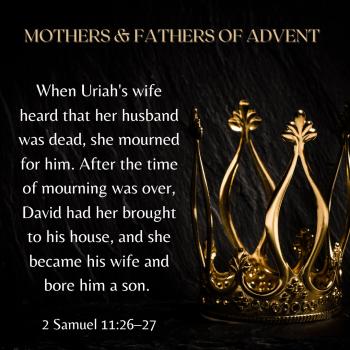
One of the most basic practices of Christian spirituality is prayer, communicating with God directly. We pray against the evils humans perpetrate upon one another, we pray for guidance and provision, we pray for strength and wisdom. If we need it and can’t get it on our own, we turn to God. Prayer is a mystery, however, because God doesn’t always answer the way we’ve asked.
My friend Jodie, a veteran women’s minister and now an award-winning podcaster and author of several Bible studies, is just the person to help us navigate the mysteries of prayer. Her latest study, Journey, explores the life of the apostle Peter—the one everyone identifies with thanks to his brash, bumbling, sincere-yet-misguided heart. Below, she’s shared one of the devotionals found in that study. What in the world is “indifferent prayer”?
~~~~~
It’s been years now, but I still remember the feeling of desperation and exhaustion like it was yesterday. I was truly running on empty. I had a fussy infant, a job that was deeply unfulfilling, a husband who was overextended due to graduate work, and barely enough money to put food on the table. I knew I couldn’t keep going with circumstances as they were—something needed to change. And so, I prayed the same prayer I had been praying for months: “Lord, please do something. Please fix this. But please don’t make us sell our house.”
Oh, you see the problem with that prayer, don’t you?
I wanted God’s help, but I wanted it on my terms. When you really boil it down, I wanted something more than I wanted God. Being years removed from the situation, I see just how much stress and anxiety I caused by fighting to hold onto something the Lord was asking me to let go of. I don’t want to minimize the situation we were in—giving up the place I called home was a big deal. Giving up anything we truly love is a big deal.
The Lord allowed me to stay in this place of desperation until I was willing to release everything to him. He wanted so much more for me, but first I needed to surrender to his will above my own. I eventually got there. We sold the house, I quit my job, and we moved into a friend’s unfinished basement. I started to breathe again, and my joy began to return. I discovered that home wasn’t just found in that little house; it could also be in an unfinished basement. In fact, for the two years we lived there, that little basement became more my home than the house had been.
This experience became a master class in God’s goodness and grace. I learned that when I prayed prayers that truly surrendered to his will, he did things that were both different and better than I could ever imagine. (Isaiah 55:8–9 and Ephesians 3:20 reinforce these truths.)
This type of prayer is sometimes called a prayer of indifference. The term indifference used in the context of prayer is credited to Ignatius of Loyola, a Spanish priest in the sixteenth century. He taught that indifference doesn’t mean we don’t care about the outcome but that we are unconcerned, or indifferent, to anything except the will of God. When indifferent, we can boldly lay our requests before God and then trust him with whatever answer he sends.
Peter Scazzero, in The Emotionally Healthy Leader, writes the following about prayers of indifference:
Arriving at this place of interior indifference and trusting that God’s will is good—no matter the outcome—is no small task. We are attached to all kinds of secondary things—titles, positions, honors, places, persons, security, and the opinion of others. When these attachments are excessive, they become disordered attachments, or disordered loves, that push God out of the center of our life and become the core of our identity.[1]
This statement is so very true. When I was holding onto our home with a white-knuckled grip, I was more identified with the safety, status, and ideals it provided than with being God’s child and wanting what he wanted. It wasn’t until I reordered my loves and put God back in his rightful place that I was able to accept his will ahead of my own. The process wasn’t easy. And I’ve had to go through this process many times. It turns out that houses aren’t the only thing I can allow to become a disordered love in my life.
This is a practice the disciple Peter also had to learn. He tried multiple times to assert his will over God’s. One of the most notable times was when Jesus told Peter and the other disciples he was going to suffer and die. Peter stepped in and declared, “Never, Lord. This shall never happen to you!” Jesus replied with words that must have stung deeply, “Get behind me, Satan! You are a stumbling block to me; you do not have in mind the concerns of God, but merely human concerns.” (Matthew 16:21–23, NIV)
If Peter had his way, he would have thwarted God’s good plan. Sure, Peter may have saved his friend Jesus from temporary pain, but at what cost? I’m not saying Peter had the power to stand in the way of God’s eternal salvation plan, but I do think we should consider the truth that we often don’t understand what God is up to. His ways are not our ways—and sometimes what looks hard and painful leads to the most fruit.
Praying with indifference helps us practice trusting in God’s plan ahead of our own.
Even Jesus modeled this for us when he prayed, “yet not as I will, but as you will.”
Is there something you have been holding onto or hoping for? Pause right now, physically place your hands to be palms facing up and open. Imagine that thing is sitting in your hands. Ask the Lord for his will to be done ahead of your own. And if you aren’t ready to do that, start by praying “Lord, help me get to the place where I can say ‘yet not as I will, but as you will.’” Remind yourself that God is good, he loves you and his plan is best – even if you don’t understand it.
In the end, God worked out my circumstances in ways I couldn’t even imagine. But I had to let God be my first love. I had to become indifferent to anything but his good plans and will.
- [1] Peter Scazzero, The Emotionally Healthy Leader (Grand Rapids: Zondervan, 2015), 196.

Jodie Niznik served in pastoral ministry for over twelve years in the Dallas, Texas area. She holds a master’s degree in Christian education with an emphasis in women’s ministry from Dallas Theological Seminary. She is the author of Choose: A Study of Moses for a Life That Matters, Crossroads: A Study of Esther and Jonah for Boldly Responding to Your Call and Trust: A Study of Joseph for Persevering Through Life’s Challenges. Find more information at jodieniznik.com.












